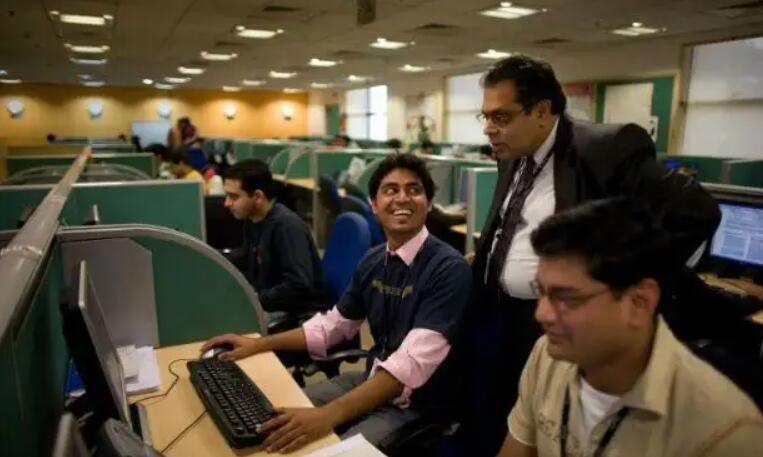[2022-11-11]QA问答:为什么印度的大多数创业公司都是基于互联网、食品和服务?为什么印度几乎没有以惊人的发明、技术、工程项目和生物技术为目标的优秀创业公司?
文章原始标题:Why most of the startups in India are only internet, food, and service based? Why there are hardly any good startups in India that has aims like amazing inventions, technology, engineering projects, and biotechnology?
国外来源地址:https://www.quora.com/Why-most-of-the-startups-in-India-are-only-internet-food-and-service-based-Why-there-are-hardly-any-good-startups-in-India-that-has-aims-like-amazing-inventions-technology-engineering-projects-and-biotechnology
该译文由蓝林网编辑,转载请声明来源(蓝林网)
内容简介: 原因很简单,许多印度人需要好的食物,快速的互联网和可靠的服务,比如交通

Subramaniam Duraisamy IT Analyst
The simple reason is a lot of Indians are in demand of good food, fast internet and reliable services like transportation. India is a low-income country where a large chunk of people is from lower middle class and middle class. Their needs are food, clothing, shelter, transport.
I find it amusing that boomers who have not worked in startups in Indian setting blathering irrelevant trope, comparing other countries systems with India. We are a UNIQUE market and we have UNIQUE needs.
By 2019 more than 60% of population has a smartphone. By 2022 the number would be higher.
As an average Indian gains more access to Internet and smartphones, he would want to have a faster delivery of food, cheaper Internet and better services related to transportation. The average user of these applications is not a Warren Buffet or Mark Zuckenberg. His basic needs remain the same. That is what platform based startups aim to solve.
【回答】IT分析员
原因很简单,许多印度人需要好的食物,快速的互联网和可靠的服务,比如交通。印度是一个低收入国家,很大一部分人来自中下层阶级和中产阶级。他们需要食物,衣服,住所,交通工具。
我觉得有趣的是,那些没有在印度创业的婴儿潮一代人,会胡扯一些不相干的比喻,把其他国家的体制与印度相比较。我们是一个独特的市场,我们有独特的需求。
到2019年,超过60%的人口拥有智能手机,到2022年,这个数字还会更高。
随着普通印度人接触互联网和智能手机的机会越来越多,他希望能够更快的食品配送、更便宜的互联网以及更好的交通服务。这些应用程序的普通用户不是沃伦•巴菲特或马克•扎克伯格。他的基本需求保持不变。这就是基于平台的初创企业所要解决的问题。
Vivek Tulja Aerospace Engineer/Scientist, Satellite Communication Expert
I am 62 years old as I write this. I have thirteen major innovations to my credit - all during my years in the US. Here is my take.
As I have said many, many times on Quora and elsewhere, India lacks a techno-scientifc culture. Yes, we do occasionally produce a Sir JC Bose or Prof CV Raman or Prof APJ Abdul Kalam, but those are exceptions not the rule.
Amazing innovation requires amazingly smart people, not paper-pushing babu’s whose dream is to become a people manager by age 27 and order people around without adding any value.
【回答】航天工程师/科学家,卫星通信专家
在写这篇文章的时候我已经62岁了。我有13项重大创新,都是在美国的这些年里。以下是我的看法。
正如我在 Quora 和其他地方多次说过的,印度缺乏科技文化。是的,我们确实偶尔会产生JC Bose爵士或CV Raman教授或APJ Abdul Kalam教授,但这些都是例外,而不是常规。
令人惊叹的创新需要令人惊叹的聪明人,而不是纸上谈兵的巴布,梦想在27岁之前成为人事经理,对人指手画脚而不增加任何价值。
As I have written many, many times on Quora, India has very few real engineers or for that matter, real technocrats in any field. India has lots of people with engineering degrees, and if that qualifies them to be called engineers, then so be it. But per my observation, 99.99% of engineers in India are technical clerks who can perhaps speak the technical language but have no clue about anything more. Throw a serious technical issue in front of them and see for yourself. If you think India is a software superpower, pick a top-notch Indian SW engineer and ask him to design a difficult, innovative algorithm and see what happens.
正如我在 Quora 上多次写到的那样,印度几乎没有真正的工程师,或者说,在任何领域都没有真正的技术专家。印度有很多拥有工程学位的人,如果这使他们有资格被称为工程师,那就这样吧。但根据我的观察,99.99% 的印度工程师是技术人员,他们可能会说技术语言,但对其他事情一无所知。在他们面前抛出一个严肃的技术问题,你就知道了。如果你认为印度是一个软件超级大国,挑选一个顶尖的印度软件工程师,让他设计一个复杂、创新的算法,看看会发生什么。
The most fundamental problem is a serious, serious lack of technology/engineering talent. Let me explain.
I have an 81-years old uncle who is a general surgeon and owns a small hospital in a tier-3 city in India. He still performs surgeries, although not as many as in his younger days. He graduated from medical school in the 1950’s. Medical technology and surgery methods have changed dramatically since then, and he has kept up with them. I see him reading, studying every day for an hour or two to learn new things. He is still, after working in his field for over 55 years, a medical technocrat.
Now, do you know of an Indian engineer, living and working in India, who graduated from a top-notch college, and at age 50, is still working as an engineer and is well versed with three generations of technologies and tools and techniques and methods? I have worked in the technology industry for 34 years, but I am yet to meet one. (Indian engineers working in the US or other countries don’t count.)
最根本的问题是严重缺乏技术/工程人才,让我来解释一下。
我有一个81岁的叔叔,他是一名普通外科医生,在印度的一个三线城市拥有一家小医院。他现在仍然在做外科手术,尽管不像年轻时那么频繁了。他50年代从医学院毕业。从那以后,医疗技术和外科手术方法发生了巨大的变化,而他一直在跟上这些变化。我看到他在阅读,每天花一两个小时来学习新东西。在他的领域工作了55年之后,他仍然是一个医疗技术专家。
现在,你知道有哪个印度工程师,在印度生活和工作,毕业于一流的大学,在50岁的时候,50岁了还在做工程师,并且精通三代技术、工具、技术和方法?我已经在科技行业工作了34年,但我还没有遇到一个这样的人。(在美国或其他国家工作的印度工程师不算在内)
Best of Indian engineering graduates either go abroad, or work in banking or consulting. (I jokingly say that IITs should be renamed Indian Institutes of Banking.) If they do happen to take an engineering job, by the time they are 25, they are looking forward to becoming people managers. Many bright engineers also appear for IAS or IES and become paper-pushing bureaucrats. The status symbol for Indian engineers is how quickly they became managers, and how many people report into them - not how many research papers they have written or how many products they have designed or how many patents they have filed.
What I have also observed is that Indian engineers, once they start working, stop reading, stop studying. (Hence the contrasting example of an Indian medical doctor above.) Many seem to think that the way to get ahead in corporate life is by networking, by fraternizing, by playing office politics. I just don’t see many that are discussing technical issues, building up their technical skills, trying to learn from others around them, thinking of innovation. (Everybody is talking about innovation all the time these days, yet there is so little of it in reality.)
最优秀的印度工程专业毕业生要么出国,要么在银行或咨询行业工作。(我开玩笑地说,印度理工学院应该更名为印度银行学院)如果他们碰巧接受了一份工程师的工作,在他们25岁的时候,他们希望成为人事经理。许多聪明的工程师也会参加IAS或IES的考试,成为纸上谈兵的官僚。印度工程师的地位象征是他们多快成为经理,有多少人向他们汇报,而不是他们写了多少研究论文,设计了多少产品或申请了多少专利。
我还注意到,印度工程师一旦开始工作,就不再阅读,不再学习了。(和上面的印度医生的例子形成了鲜明对比)许多人似乎认为,在企业生活中取得成功的方式是建立人脉、联络感情、玩弄办公室政治。我只是没有看到很多人讨论技术问题,提高自己的技术技能,努力向周围的人学习,思考创新。(如今每个人都在谈论创新,但实际上却很少有创新)
Various research labs and product companies in the US (and elsewhere too) employ small armies of highly distinguished engineers that have a vast body of knowledge and experience in their respective fields. How many such people can India boast? Maybe ISRO has a few - like Prof APJ Abdul Kalam but we need 100,000 engineers like Prof Abdul Kalam to have any chance at competing with the big boys.
If you don’t agree with me, just ask yourself this: Why has India not produced a single world class product so far? Never mind airplanes, that is far too hard and takes at least 30–40 years of cumulative experience-building. Does India produce a great car? Does India produce a highly successful software product, like SAP or Salesforce? Great bicycles? Great furniture that is in high demand everywhere?
If we fix this problem, all other challenges will go away. I see this as more of a cultural issue.
美国(以及其他地方)的各种研究实验室和产品公司都雇佣了一小批在各自领域拥有丰富知识和经验的杰出工程师。印度能有多少这样的人?也许印度航天局有一些像 APJ Abdul Kalam 教授这样的工程师,但是我们需要10万名像 Abdul Kalam 教授这样的工程师才有机会和大公司竞争。
如果你不同意我的观点,问问你自己:为什么印度到目前为止还没有生产出一种世界级的产品?更不用说飞机了,这太难了,至少需要30-40年的积累经验。印度能生产出好车吗?印度能生产出像 SAP 或 Salesforce 这样非常成功的软件产品吗?很好的自行车?世界各地都很抢手的好家具?
如果我们解决了这个问题,所有其他的挑战都会消失。我认为这更多的是一个文化问题。
Sumanth Murthy Lives in The United Kingdom (2021–present)
India is fundamentally a consumer economy for many entrepreneurs and foreign investors who primarily put money into startups. Thus you have a gluttony of startups in Delivery services for food or groceries or cabs or whatever else.
【回答】在英国生活(2021年-至今)
对于许多企业家和外国投资者来说,印度基本上是一个消费经济体,他们主要把钱投入初创企业。因此,在食品、杂货、出租车或其他任何东西的快递服务方面,你会看到一大堆初创公司。
Shashanky Software engineer (INFJ)
Haha when you have 1 billion people competing with each other for jobs and dying to do even basic 5000rs job or less in the name of labor, Where the fuck innovation will come by?????????
And top of that all the startups in India copy ideas implemented somewhere else and then build a app in the name of hotel, transport, food or e commerce and then its all about marketing and fooling VCs to inflate the value of the startup.
In India everyone is trying to cheat others to make more money whether its startups or stocks or anything.
Inventions needs years of research and patience by an investor to profit from it, In India we hardly have good PHDs scholars, the good ones are already in US and Europe.
【回答】软件工程师(INFJ)
哈哈,当你看到10亿人为了工作互相竞争,甚至想以劳动的名义做5000卢比或更少的基本工作,他妈的创新会从哪里来???
最重要的是,所有印度的初创企业都是复制其他地方实现的创意,然后以酒店、交通、食品或电子商务的名义开发一款应用程序,然后就是营销和愚弄风投,来夸大初创公司的价值。
在印度,无论是初创企业还是股票或其他任何东西,每个人都在试图欺骗他人以赚取更多的钱。
发明需要投资者多年的研究和耐心才能从中获利。在印度,我们几乎没有优秀的博士学者,优秀的博士学者已经去美国和欧洲。
Mufaddal Rasheed Knowledge seeker
Core Engineering innovation i.e. Creating novel and path breaking complex engineered products ( hardware + software ) requires :
* Long term purpose, vision and strategy
* Lots of Money and time
* Talent to convert problem statements into elegant and complex multi-disciplinary engineered solutions which meets market needs
* Risk taking appetite
* Government support and enabling environment
Getting all of them working in unison is “very difficult” .
Its easier to develop an app for a large section of population which solves a service related problem , it is much less riskier and talent required is minimal .
Whereas developing a new mechatronic system , maybe a new robot requires talented mechanical design engineers , electronics engineers, control engineers, programmers all working in sync to develop a system/ product which meets market requirements.
Designing for the real physical world has alot more challenges than designing for the virtual world. We cant fix mechanical failure by adding a line of code .
That being said there are good amount of Indian startups who are working on core Engineering innovation and the difficult part. Though they are a miniscule percentage of the majority service focused ones.
【回答】
核心工程创新,即创造新颖和突破性的复杂工程产品(硬件 + 软件)需要:
* 长远目标、愿景及策略
* 大把的金钱和时间
* 具备将问题说明转化为符合市场需求的优雅和复杂的多学科工程解决方案的人才
* 冒险意愿
* 政府支持和扶持环境
让他们所有人协同工作是“非常困难的”。
为面向大量人群开发一个解决服务相关问题的应用程序是比较容易的,它的风险要小得多,需要的人才也很少。
而开发一款新的机电系统,或者一款新的机器人需要有才华的机械设计工程师、电子工程师、控制工程师和程序员同步工作,以开发一款符合市场需求的系统/产品。
为真实的物理世界设计比为虚拟世界设计有更多的挑战。我们不可能通过添加一行代码来修复机械故障。
话虽如此,还是有大量的印度初创企业致力于核心工程创新和困难的部分。尽管这些企业只占大多数服务型企业的很小一部分。
Ramakrishnan Parthasarathy Lives in Bengaluru, Karnataka, India
I have worked with quite a few startups in my career. The key things that I’ve observed as a service provider to these guys from the outside-in are:
* The startups that are “young” and “fresh” out of college are inevitably about solving problems in a world where the average person has more interactions with the mobile phone than with people. So, the e-commerce, the food, logistics, edutech and the other service based stuff are theirs for the taking. Some of these guys write software for American companies even during college, so they’re exposed to “big” paychecks even before graduation. And top colleges instill an appetite for risk compared to the tier-2/3 ones because failures wouldn’t necessarily mean loss of careers.
* There are a few super-geniuses that work for deep tech US companies in Bangalore. I’ve seen a couple; one was a guy that didn’t even look you in the eye and he came up with amazing algorithms for noise reduction in video frames/images. The lots that work for US tech companies are far more aware of what they come up with and have a system to classify what they come up with than the standard Indian. And Indian companies have these learn-while-you-work thing like in the US and are top-heavy and sales-dominated. The US could afford this because of the prevalence of mentorship and a mature setup to handle things.
【回答】住在印度卡纳塔克邦班加罗尔
在我的职业生涯中,我曾与不少初创公司合作过。作为这些人的服务提供者,我从外部到内部观察到的关键点是:
那些“年轻”和“新近”的创业公司不可避免地要解决这样一个问题:在这个世界上,普通人与手机的互动要比与人的互动多。因此,电子商务、食品、物流、教育技术和其他基于服务的东西都是他们的目标。他们中的一些人甚至在大学期间就为美国公司编写软件,所以他们在毕业之前就已经有“丰厚”的薪水了。而且与二三流大学相比,顶尖大学培养了冒险精神,因为失败并不一定意味着失去职业生涯。
班加罗尔有一些为美国高科技公司工作的超级天才。我见过几个,其中一个甚至不会直视你的眼睛,他想出了惊人的视频帧/图像的降噪算法。为美国科技公司工作的那些人,远比普通的印度员工更了解自己所想的东西,而且有一套系统来对自己能想出的东西进行分类。印度公司也有像美国那种边工作边学习的模式,头重脚轻,以销售为主。美国之所以能够负担得起,是因为导师制盛行,而且有一套成熟的机制来处理这些事情。
Prashant Singh Passionate about Economics and Politics
It’s not true that we don’t have startups who have actually built a product but yes most entrepreneurs prefer to launch something in e-commerce space because it’s relatively easier to build compared to building a full-fledged ERP software. Most of these startups then fail because business model can be easily replicated by big companies like Amazon, Google, Reliance etc.
【回答】热爱经济和政治
并不是说我们没有真正开发过产品的创业公司,但是的,大多数创业者更喜欢在电子商务领域开发一些东西,因为相对于开发一个成熟的 ERP 软件来说,开发这些东西相对容易。这些创业公司之所以失败,是因为商业模式很容易被亚马逊、谷歌、信实等大公司复制。



